Daily Vocabulary Words: List of Daily Used Words in Leading Indian Newspapers
Hi there. Welcome to this special section @ Wordpandit. Our endeavour here is straightforward: highlighting daily vocabulary words that you would come across in leading newspapers in the country. We have included the following newspapers in our selection:
• The Times of India
• The Economic Times
• Hindustan Times
• Mint
• Indian Express
We are putting in extensive work to develop your vocabulary. All you have to do is be regular with this section and check out this post daily. This is your repository of commonly used words; essentially, we are posting a list of daily used words. Hence, this has significant practical application as it teaches you words that are commonly used in leading publications mentioned above.
Visit the website daily to learn words from leading Indian newspapers.
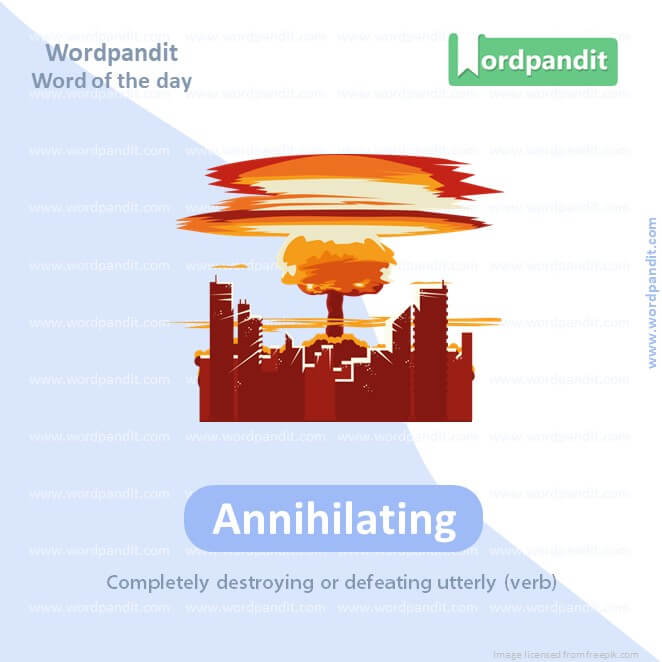
WORD-1: Annihilating
CONTEXT: These onslaughts were aimed at annihilating the very foundations of our Sanatan Sanskriti.
SOURCE: Hindustan Times
EXPLANATORY PARAGRAPH: Imagine a building being completely destroyed until there’s nothing left. That’s like annihilating. It means to destroy something totally or defeat someone completely.
MEANING: Completely destroying or defeating utterly (verb)
PRONUNCIATION: uh-NYE-uh-lay-ting
SYNONYMS: Destroying, Obliterating, Wiping out, Eradicating, Decimating
USAGE EXAMPLES:
1. The fire was annihilating the entire forest.
2. The team was annihilating their opponents in the game.
3. The new policy was aimed at annihilating corruption.
4. The hurricane was annihilating the coastal towns.
WORD-2: Embodiment
CONTEXT: With the disreputable Donald Trump challenging the disfavoured President Biden, the 2024 race has become the embodiment of Oscar Wilde’s witticism about fox hunting: “the unspeakable in pursuit of the inedible”.
SOURCE: Times of India
EXPLANATORY PARAGRAPH: Imagine someone who is always happy and makes others happy too. They are the embodiment of happiness, which means they are a perfect example of it.
MEANING: A tangible or visible form of an idea, quality, or feeling (noun)
PRONUNCIATION: em-BOD-ee-ment
SYNONYMS: Personification, Incarnation, Epitome, Manifestation, Quintessence
USAGE EXAMPLES:
1. She is the embodiment of kindness.
2. The statue was the embodiment of the city’s spirit.
3. His work is the embodiment of creative freedom.
4. The new law is the embodiment of fairness.
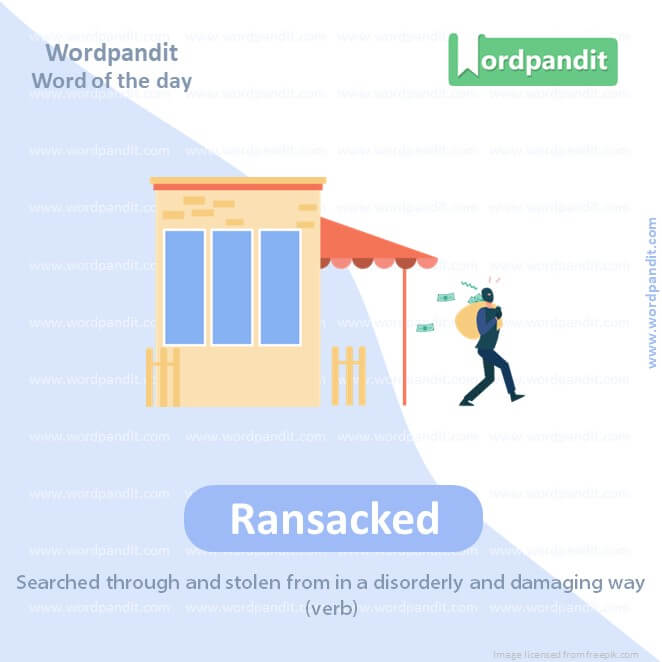
WORD-3: Ransacked
CONTEXT: Ayodhya’s Ram Mandir was demolished by Babur’s army while Aurangzeb ransacked Kashi Vishwanath, and Krishna Janmabhumi and hewed the Vrindavan Gobind Dev temple into half.
SOURCE: Hindustan Times
EXPLANATORY PARAGRAPH: Think about someone making a big mess in a room, searching for something everywhere. That’s ransacking. It means searching a place untidily, often to steal things.
MEANING: Searched through and stolen from in a disorderly and damaging way (verb)
PRONUNCIATION: RAN-sakt
SYNONYMS: Plundered, Looted, Pillaged, Ravaged, Sacked
USAGE EXAMPLES:
1. The burglars ransacked the house for valuables.
2. After the party, the room was completely ransacked.
3. They ransacked the store during the riot.
4. Her desk was ransacked in her absence.
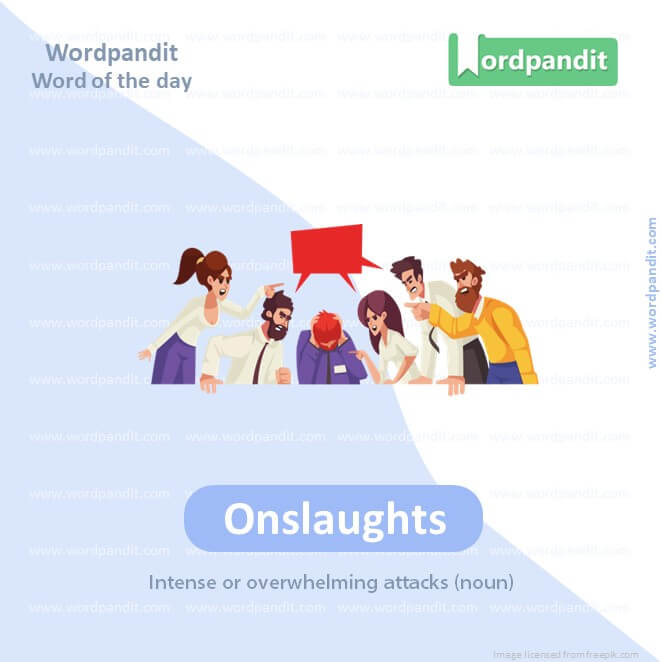
WORD-4: Onslaughts
CONTEXT: These onslaughts were aimed at annihilating the very foundations of our Sanatan Sanskriti.
SOURCE: Hindustan Times
EXPLANATORY PARAGRAPH: Imagine a lot of soccer balls being kicked towards a goalie at once. That’s like an onslaught. It means a fierce or destructive attack or a large quantity of people or things that is difficult to cope with.
MEANING: Intense or overwhelming attacks (noun)
PRONUNCIATION: ON-slawts
SYNONYMS: Assaults, Attacks, Barrages, Invasions, Offensives
USAGE EXAMPLES:
1. The castle withstood several onslaughts.
2. The onslaught of questions from the reporters was overwhelming.
3. They faced an onslaught of criticism.
4. The beach was facing the onslaught of the high tide.
WORD-5: Resurgence
CONTEXT: The Ram Mandir being constructed with public donations will signal the resurgence of Bharat’s sanatan sanskriti, now firmly poised to guide the world.
SOURCE: Hindustan Times
EXPLANATORY PARAGRAPH: Imagine a sports team that wasn’t doing well but suddenly starts winning again. That’s resurgence. It means something is becoming popular, active, or important again after being quiet or weak.
MEANING: An increase or revival after a period of little activity, popularity, or occurrence (noun)
PRONUNCIATION: re-SUR-jens
SYNONYMS: Revival, Renewal, Recovery, Comeback, Reawakening
USAGE EXAMPLES:
1. There’s been a resurgence of interest in knitting.
2. The team’s resurgence was unexpected.
3. The economic resurgence boosted the country’s morale.
4. The resurgence of the movement was inspiring.
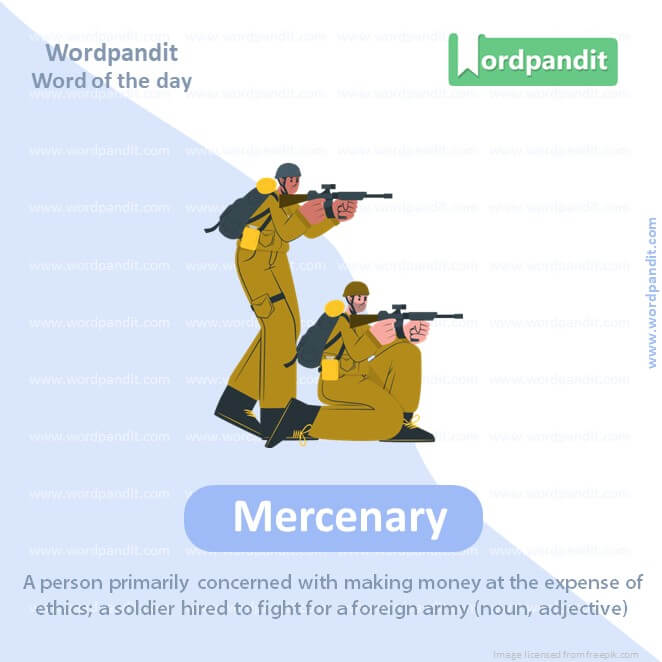
WORD-6: Mercenary
CONTEXT: While some may whitewash religious motives as political or motivated by loot, the blunt reality was a mercenary mindset teeming with intolerant iconoclasm.
SOURCE: Hindustan Times
EXPLANATORY PARAGRAPH: Think of a soldier who fights for any country that pays them, not just their own. That’s a mercenary. They work or fight only for money, not because they believe in the cause.
MEANING: A person primarily concerned with making money at the expense of ethics; a soldier hired to fight for a foreign army (noun, adjective)
PRONUNCIATION: MUR-suh-nair-ee
SYNONYMS: Hired soldier, Soldier of fortune, Professional soldier, Money-driven, Greedy
USAGE EXAMPLES:
1. The mercenary fought for whichever country paid him the most.
2. His mercenary attitude towards work disappointed his colleagues.
3. Mercenary troops were hired to supplement the army.
4. She was criticized for her mercenary approach to the project.
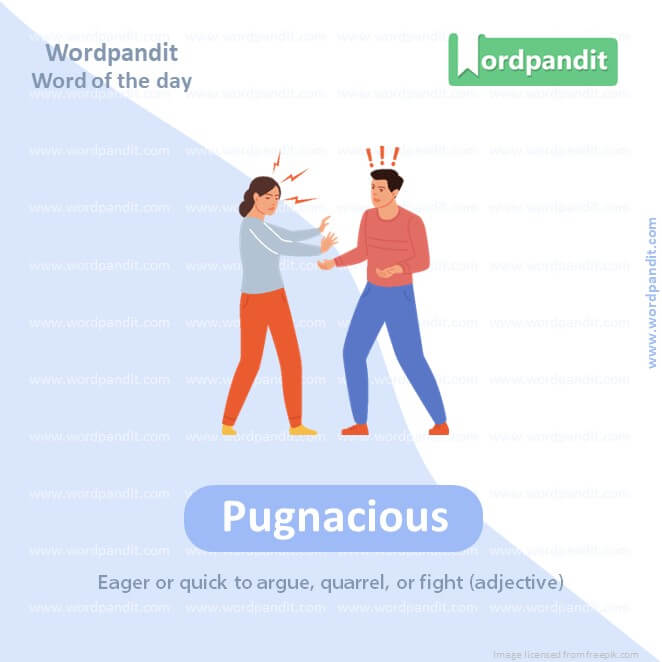
WORD-7: Pugnacious
CONTEXT: He flew to Pennsylvania on Friday to visit Valley Forge and make a pugnacious speech invoking an earlier moment when we were fighting against despotism and clinging to a dream of a democracy.
SOURCE: Times of India
EXPLANATORY PARAGRAPH: Imagine a little dog that always wants to fight, even though it’s small. That’s being pugnacious. It means someone who likes to argue or fight a lot.
MEANING: Eager or quick to argue, quarrel, or fight (adjective)
PRONUNCIATION: pug-NAY-shus
SYNONYMS: Combative, Aggressive, Quarrelsome, Belligerent, Argumentative
USAGE EXAMPLES:
1. The pugnacious boy often got into fights at school.
2. Her pugnacious attitude made it hard to discuss peacefully.
3. He had a pugnacious approach to business.
4. The debate became heated due to his pugnacious nature.
WORD-8: Culminate
CONTEXT: This month, a 550-year-long epochal wait will finally culminate to herald the civilisational renaissance of Bharat, when Prime Minister (PM) Narendra Modi takes part in the pran pratistha ceremony at Ayodhya’s Ram Mandir.
SOURCE: Hindustan Times
EXPLANATORY PARAGRAPH: Think of working really hard on a big project and finally finishing it. That’s like culminate. It means to end or arrive at a final stage, usually as the result of a process.
MEANING: Reach a climax or point of highest development (verb)
PRONUNCIATION: KUL-muh-nate
SYNONYMS: Peak, Conclude, Finish, Cap, Climax
USAGE EXAMPLES:
1. The event will culminate with a fireworks display.
2. Years of research culminated in a groundbreaking discovery.
3. The arguments culminated in a dramatic showdown.
4. The festival will culminate in a grand parade.
WORD-9: Triumphant
CONTEXT: The Tamil collection of poetry, Akananooru, composed 2,000 years ago cites a triumphant Rama conversing under a banyan tree at Dhanushkodi.
SOURCE: Hindustan Times
EXPLANATORY PARAGRAPH: Imagine winning a race and feeling really happy and proud. That’s triumphant. It means having achieved a great victory or success.
MEANING: Having achieved a great victory or success (adjective)
PRONUNCIATION: try-UM-funt
SYNONYMS: Victorious, Winning, Successful, Conquering, Celebratory
USAGE EXAMPLES:
1. She raised her hands in a triumphant gesture.
2. The triumphant team celebrated their win.
3. He returned home triumphant after the competition.
4. The movie had a triumphant ending.
WORD-10: Quintessentially
CONTEXT: This mention in the Sangam age literature quintessentially illustrates how Lord Rama personifies Bharat’s civilisational connect.
SOURCE: Hindustan Times
EXPLANATORY PARAGRAPH: Think of something that is the most perfect example of its type. Like, if you think of a superhero, you might think of someone strong and brave. That’s quintessentially superhero-like. It means being the most typical example or most important part of something.
MEANING: Representing the most perfect or typical example of a quality or class (adverb)
PRONUNCIATION: kwin-teh-SEN-shuh-lee
SYNONYMS: Essentially, Perfectly, Ultimately, Ideally, Prototypically
USAGE EXAMPLES:
1. She is quintessentially the star of the show.
2. The small village was quintessentially English.
3. His style is quintessentially modern.
4. The dish was quintessentially French in flavor.
Vocabulary Words in English
In the kaleidoscopic world of language, the thread of ‘vocabulary words in English’ weaves a rich tapestry. These words, the building blocks of communication, lend themselves to the eloquence and effectiveness of our speech and writing. Despite their significance, mastering ‘vocabulary words in English’ can sometimes be daunting, but with strategic approach, the process can be greatly simplified.
Learning ‘vocabulary words in English’ goes far beyond rote memorization. It requires an integrated approach that encompasses understanding and using the words. Consuming a diverse range of English materials such as novels, news articles, movies, music, and online content can acquaint you with words in actual use, helping you perceive both their meaning and usage in different contexts.
Furthermore, incorporating memory-enhancing techniques can add impactful strides to your journey of mastering ‘vocabulary words in English’. Methods such as the Leitner System or flashcards can bolster the memory retention of these words. Meanwhile, using mnemonic devices, associating words with unique stories or images, can help in retaining the ‘vocabulary words in English’ in long-term memory.
Another key to deciphering ‘vocabulary words in English’ is by practicing them in real-world contexts. Incorporate the new words into your daily conversations, written emails, or social media posts. Not only will this reinforce the meanings and applications, but also boost your confidence in using them.
In essence, understanding ‘vocabulary words in English’ is a continual journey that calls for persistent commitment, diverse learning approach, and ample practice. As you indulge in this exploration, you will find your command over the ‘vocabulary words in English’ becoming stronger, leading to more confident and dynamic communication. Remember – in the world of language, words are your faithful companions, and the more you engage with them, the more they’ll reveal their richness to you.













